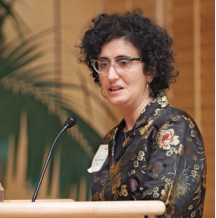Barbara Olshansky ’85: Public Interest Lawyer of the Year
Barbara Olshansky ’85 won the biggest case of her legal career when the U.S. Supreme Court in 2004 ruled that detainees at the U.S. facility in Guantanamo Bay, Cuba, could challenge their incarceration in federal court. Rasul v. Bush, which The New York Times hailed as “the most important civil liberties case in half a century,” reined in presidential power in prosecuting the war on terror.
But more than a year later, despite help from hundreds of pro bono lawyers working under Olshansky’s oversight, not one habeas corpus petition has been heard in federal court. Having lost on the habeas corpus issue, the U.S. Department of Justice is now arguing that “enemy combatants” simply have no rights to enforce. Worse, the Supreme Court’s ruling may be negated as a practical matter if the Graham-Levin amendment, a measure limiting detainees’ rights which passed the Senate in late November, becomes law. “I feel like I’m arguing Rasul all over again,” said Olshansky, deputy legal director of the Center for Constitutional Rights in New York City.
The Rasul ruling thrust Olshansky onto the international stage as the lead lawyer of the defining case in post– September 11 America. It’s her first major national security battle in a career that has spanned such specialties as the environment, health care, racial discrimination, and prisoners’ rights.

In honor of her work, Olshansky was named 2005 Public Interest Lawyer of the Year by the Stanford Public Interest Law Foundation at a November 9 dinner on Stanford’s campus. The two previous winners were Anthony Romero ’90, executive director of the American Civil Liberties Union, and Peter Bouckaert ’97, a senior emergencies researcher at Human Rights Watch. “The work of people like Barbara Olshansky is ultimately work that holds up a mirror to us and makes us confront ourselves,” said Larry Kramer, Richard E. Lang Professor of Law and Dean. “It’s people like Barbara who force us to be our best selves.”
Olshansky grew up in the New York City suburb of Ossining, with dreams of emulating Atticus Finch, the fictional hero of To Kill a Mockingbird who defends a black man against an undeserved rape charge. After majoring in intellectual history and political science at the University of Rochester, she came to Stanford Law School, where she helped establish the East Palo Community Law Project to serve low-income residents. Olshansky then clerked for two years for California Supreme Court Chief Justice Rose Bird, who inspired her to pursue a career helping the less fortunate. “[Rose Bird] believed that the judicial system was for helping people,” Olshansky said. “She made me believe I could make a difference.”
After working in a small plaintiff’s-side employment firm in New York, Olshansky joined the Environmental Defense Fund, where she argued cases involving toxic contamination in the workplace and the community. Four years later, she joined the Center for Constitutional Rights, the nonprofit legal organization founded in 1966 by famed attorney William Kunstler and others who had represented civil rights demonstrators in the South.
“She’s smart, she’s well-regarded, and she comes up with lawsuits that go to the heart of the major issues that affect the weak, the poor, and the helpless,” said Franklin Siegel, an adjunct professor at City University of New York School of Law. “This is legal genius; there’s no other word for it.”
When Olshansky filed the Guantanamo litigation on behalf of Shafiq Rasul in the U.S. District Court for the District of Columbia, she never imagined the case would make its way to the U.S. Supreme Court. The case was the first major test of whether the executive branch had exceeded its powers in asserting that Guantanamo Bay was outside the jurisdiction of any court.
Soon after the Supreme Court issued its decision in Rasul, CCR, which represents about half of the camp’s 500 prisoners, was flooded with calls from private law firms eager to become involved. Since then, Olshansky has worked with more than 500 volunteer attorneys from more than 125 major law firms in filing more than 200 habeas petitions.
Jeff Wu ’00 (MBA ’01), of Covington & Burling in San Francisco, is one of the many attorneys inspired to provide detainees with legal representation. Wu is helping several retired military officers file amicus briefs in another Guantanamo case, Hamdan v. Rumsfeld, to be heard by the Supreme Court in March. The case challenges the president’s authority to establish military commissions to try detainees charged with terrorist offenses. “There are some high-profile lawyers with big egos in this group, and she handles them with a very low-key, mellow, non-confrontational approach,” said Wu. “She’s good at resolving those conflicts. She simply has the case at heart.”
